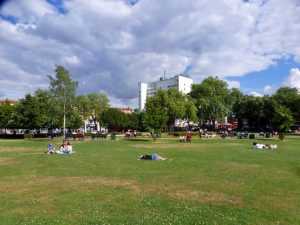Support us from £3/month
We deal with almost 1000 cases a year assisting communities, groups and individuals in protecting their local spaces and paths in all parts of England and Wales. Can you help us by joining as a member?
Following the launch earlier this month of the Ministry of Housing, Communities and Local Government’s Planning for the Future consultation, funding in the form of grants made to community groups involved with shaping their local planning policy is set to almost double. Government grants to individual neighbourhood planning groups in both urban and deprived areas will increase to £18,000. This follows the basic grant funding increasing from £9,000 to £10,000 in May to help with the effects of Coronavirus.

Haven Green common, a vital open space in Ealing, London.
The government also announced it is providing groups representing some of the most deprived urban areas in England with access to additional technical expertise free of charge, such as for assessing their area’s housing needs, or developing masterplans.
Case officer, Nicola Hodgson comments, ‘I welcome the announcement which will help communities to obtain additional help to navigate the neighbourhood plan process’.
Useful information and definitions taken from the government press release:
- Neighbourhood planning groups are local people who shape planning decisions in their area – such as the location of new homes, shops, offices and green spaces – through the production of neighbourhood plans.
- Neighbourhood planning enables communities to play a much stronger role in shaping the areas in which they live and work and in supporting new development proposals. A neighbourhood plan forms part of the development plan and sits alongside the local plan prepared by the local planning authority, as the starting point for planning decisions.
- Neighbourhood planning groups who wish to seek funding and technical support can do so by applying through Locality’s website: neighbourhoodplanning.org
- The criteria for falling in to an ‘urban’ area is being non-parished; the criteria for falling in to a ‘deprived’ area is being amongst the 20% most deprived areas in England in accordance with the Index of Multiple Deprivation; and therefore areas that are either non-parished, amongst the 20% most deprived areas, or both non-parished and amongst the 20% most deprived areas, would be eligible for the additional grant and technical support.
Read the government press release in full here.
Visit our neighbourhood planning page for more general information about the local planning process and how you can get involved.
